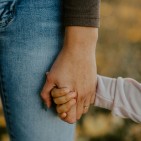
Good news! Resilience, the ability to bounce back from difficult times, is a skill that we can all learn. There are things that detract from resilience and things that help to build it. We aren’t given a set dose of it and asked to navigate life with our allotted serving. Knowing this is a huge reason why I began sharing what I learned from my own parenting journey with others.
Studying wellbeing and resilience has been a wonderful personal adventure. What drives me now, as a physician and an educator, is to help people understand that they have the power to take charge of their lives, their families, and their own destinies alongside their healthcare team. The decisions they make can have a huge impact on their own happiness, as well as future generations to come.
Striving to raise happy, healthy kids in today’s world is one of the most difficult, time consuming and expensive challenges that anyone can undertake, yet it can be the most rewarding and fulfilling. I try to help caregivers understand the, “Why?”. Why would new behavioural approaches to parenting make a difference? Scientific evidence is telling us is that there are behavioural systems that will protect our biological systems both mental and physical. What?!
Balancing the ‘Soft’ with the ‘Strong’:
I always start by discussing our nervous system and what it is doing in the background as we pass through life. Part of our nervous system, the autonomic system, is like the automatic pilot for the rest of our body. It is constantly, and subconsciously, picking up cues from our environment and trying to make sense of them. We know now that the old nature vs nurture argument is not a simple dispute. Who we become is based on nature (what our genetics bring in) as well as nurture (what happens to us). For example, we may be predisposed to a certain illnesses genetically (e.g. depression, cardiovascular disease, autoimmune disorder, etc.) but it may take something in the environment to trigger it into presenting itself. We are realizing that during early life, and even before conception, there are factors at play that may ramp up our nervous system making us more sensitive to stress. If our stress response is triggered too often or too much, it creates wear and tear on us mentally and physically leading to a whole host of illnesses. When stressors occur too often in childhood without proper buffering, they can alter the developing architecture of the brain and the nervous system. This remolding will prepare the youngster for a threatening and dangerous world. This may be helpful in the short term (to protect them from physical threat); however over time, this amped up stress response can make their minds and bodies prone to breakdown over a long period. Healthy, supportive relationships reduce our stress response. It’s beautiful!
What ultimately helps children flourish is to help them develop the knowledge that they are good enough, strong enough and worthy enough to handle whatever comes their way. The irony is that in order to do this, they first need to feel safe and secure. They need to depend on someone who has their back through good times and not so good times. The more people in a youngster’s life who can buffer them in this way, the better that child will do.
One of the most difficult things I have found on my journey is finding the balance between the soft and the strong. Children need a soft place to fall when stress becomes more than they can bear, and they also need encouragement and our strength to push them to do things they think they can’t do. “I know this is difficult but I’m behind you! I know you can do this.” It turns out that mild to moderate stressors are key to helping us gain the confidence to strengthen the ‘muscle’ that says, “Wow, I CAN do this!” The more experiences we have that prove this, the more willing we are to take bigger and bigger risks. Life then begins to grow and opportunities expand before us. Because this balance can be difficult to navigate, I am a huge advocate for evidence based parenting classes. Parenting is hard! If we didn’t have parents who taught us to feel safe and supported (and therefore naturally pass on this gifts to our children) we can learn these skills. If we become a safe and supportive place for ourselves and for our children, our children will be able to parent their children with love and kindness. What a magnificent gift to pass down through generations.
When I talk with young people who are on their journey towards healing, or when I reflect upon times in my own life when I was suddenly catapulted towards change, common themes emerge. Dr. Ken Ginsberg’s “7 Cs of Resilience” touch on many of these themes. These Cs help children build the internal beliefs that make them more resistant to anxiety, depression and stress related illnesses.
- Competence – finding opportunities to experience, “I can do it!”
- Confidence – building confidence through positive experiences
- Connection – allowing for positive social experiences
- Character – developing their internal moral compass
- Contribution – finding opportunities to give back builds worthiness and confidence
- Coping – though this situation is hard, I have the experience and resources to handle this
- Control – having a sense of control over their lives by allowing for choice (within reason)
These Cs help build the resources necessary to handle stressors. The goal isn’t to clear the path for children to have no stress; this would be detrimental to their development and actually hold them back. The goal is to help them gain the skills to meet these stressors head on and succeed!
Humans are social beings who need one another. Connection to ourselves and to each other is key to our resilience and our happiness. The more we learn about what it takes for us to feel safe and secure the more profoundly we will understand how true healing takes place.
Listen to Dr. Uyeda speak more about resiliency in youth on our podcast episode here!







